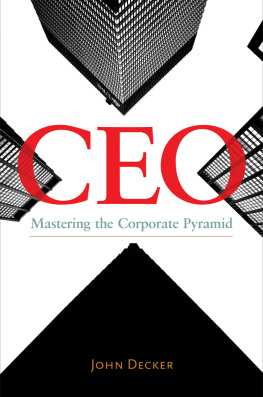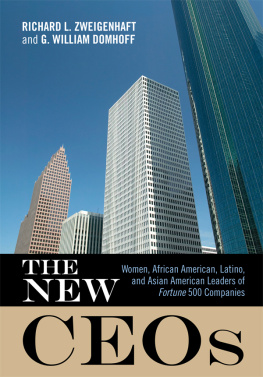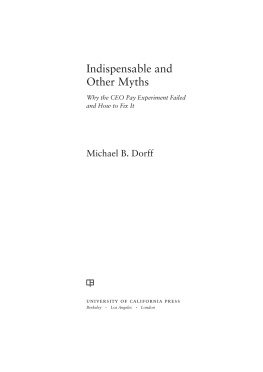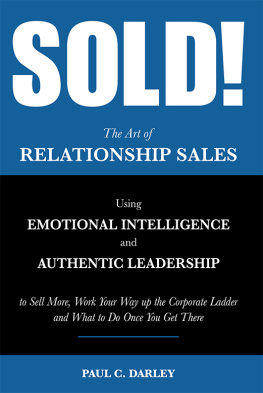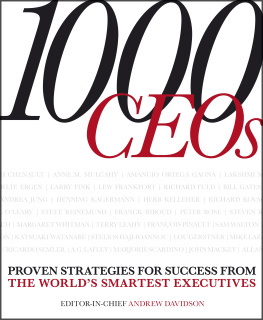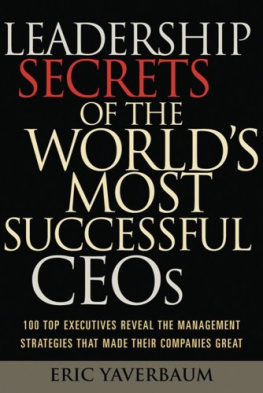CEO
Mastering the Corporate Pyramid
John Decker

Copyright 2016 by John Decker
All rights reserved. No part of this publication may be reproduced, stored in a retrieval system, or transmitted, in any form or by any means, electronic, mechanical, photocopying, recording, or otherwise, except for the inclusion of brief quotations in a review, without prior permission in writing from the publisher.
Library of Congress Cataloging-in-Publication Data
Decker, John C., author.
CEO : mastering the corporate pyramid / John Decker.
pages cm
Includes bibliographical references and index.
ISBN 9781440840166 (hardback) ISBN 9781440840173 (ebook) 1. Chief executive officers. 2. Executive ability. 3. Leadership. 4. Career development. I. Title.
HD38.2.D4272016
658.42dc232015031279
ISBN: 9781440840166
EISBN: 9781440840173
20 19 18 17 161 2 3 4 5
This book is also available on the World Wide Web as an eBook.
Visit www.abc-clio.com for details.
Praeger
An Imprint of ABC-CLIO, LLC
ABC-CLIO, LLC
130 Cremona Drive, P.O. Box 1911
Santa Barbara, California 93116-1911
This book is printed on acid-free paper 
Manufactured in the United States of America
I am fortunate to have four shining lights in my life. All four illuminate and inform in different ways what I do and why I do it.
My mother, Elnora Decker, is a completely good person and by her example inspires everyone around her.
Anne, my wife, partner, and friend, is both a leader and my greatest supporter.
My daughters, Rachel and Nicole, are successfully balancing the demands of family and working to make the world a better place, one leading an environmental nonprofit and the other combating domestic violence and teaching English as a Learned Language.
I am always inspired by and thankful for each.
Contents
Acknowledgments
I have been fortunate to work with nearly 2,000 executives and CEOs helping them crystalize their career direction, uncover and land new opportunities, and succeed in their chosen adventures. I have learned something new from every one of them. They have also been kind enough to introduce me to their friends and associates, significantly expanding my range of resources for this book. If there is anything useful to you in these pages, it is because of them. I sincerely appreciate their relationships, help, and wisdom.
A number of people deserve special thanks for their assistance:
Misha Charles, Charter Board Partners
Ed Crowley, Tim Sullivan, Harvard Business School Publishing
Keith Darcy, former Executive Director, Ethics and Compliance Officers Association
Eric Davies, Davies and Murphy Group, Public Relations
Robert Decker, PhD, and Suzanne Serpas Decker for incisive advice
Mike DiFranza, President, Linkable Networks
Peter Gleason, President, National Association of Corporate Directors (NACD)
Robert Gough, PhD, MDL Partners
Doug Lynch, Chief Academic Officer, CorpU
Raj Sisodia, FW Olin Distinguished Professor of Global Business, Babson College, Cofounder, Conscious Capitalism, Inc., coauthor, Conscious Capitalism
Norman Strate and Den Taylor, Strategic Insights, LLC
Alexia Taxiarchos, Investor Relations Manager, Hasbro, former Boston Chapter President, National Investor Relations Institute (NIRI)
Jim Wall, Board of American Management Association, former International H.R. Principal, Deloitte
Dave Wenhold, Partner, Miller-Wenhold Capital Strategies and former President, American League of Lobbyists
Mark Steinwinter, Director, IT Services, Unitarian Universalist Association
Paul Wing, PhD, President, Planning & Research Services
Maureen Wolff, President and Partner, Sharon Merrill Associates, Inc., former Chairwoman of the Board and Director, NIRI.
The following individuals also deserve special note:
Jeff Allar, Ray Allieri, Charles (Chuck) Bauer, Steve Bogiages, Doug Brockway, Bob Brody, Romeo Catracchia, Darryl Canfield, Jamie Cornell, Wally Creek, Alan Crunkleton, Michail Curmi, Alvaro Diez, Greg Fields, Fil Firmani, Bill Hewins, Robert Holland, Paul Hovsepian, George Keches, David Kuttler, Jed Lindholm, Mike Lorelli, Bill Mackin, Gami Maislin, Jim Micali, Mark Norige, Michael Parks, Tom Pavilon, David Pendergast, Mark Pope, Bernie Prusaczyk, Pat Rezza, James Sampel, Greg Shortell, Paul Stimson, Michael Stier, Ted Stone, Charles Stuppard, John Sullivan, Mike Umana, Andrew Vineyard, David White, Bob Willis, and Steve Wishner.
Thanks to my associates at MDL Partners:
Tom McNeil who provided time and a flexible schedule
Teri Kowiak for many creative ideas
Lynne Miller for keeping my schedule as organized as possible
Kelly Hopkins for her editing assistance
Melody Martin for her social media expertise.
Also thanks to Hilary Claggett, Senior Editor, Business and Finance, ABC-CLIO/Praeger/Greenwood for her insightful advice, guidance, and support. She obviously has done this before and is truly an expert. Thanks to John Murphy (President, Venture Management Associates) and Devra Jacobs, literary agent, for leading me to Hilaryclassic networking in action.
Last but certainly not least, my wife, Anne, for her support, patience, suggestions, and advice during the very long incubation and birth of this book.
It takes a village to raise a child. As you can see in this case, it took a small army to build this book. I am not a detail-oriented record keeper, so I apologize beforehand to anyone whom I have inadvertently omitted.
Introduction
There are 1,000 CEOs of Forbes Global 1000 companies (duh!), give or take a few at any given moment, and about 500 CEOs of Fortune 500 companies. Each typically has a president, COO or other number two executive, and an additional 8 to 10 direct reports; a total of roughly 15,000 senior executives at the top of the corporate pyramid. Assuming 1.5 billion workers globally, the probability of reaching this pinnacle is about 1 in 100,000, better than the odds of winning millions in the lottery, and better than the odds of becoming a professional athlete (but probably not as much fun). If you also consider the large and growing number of significant private companies, where median CEO income is over $360,000, the odds are even better.
Odds at 1 in 100,000 are not great, but the rewards are clearly significant. The media is delighted to point out the compensation and perks of senior executives: multimillion-dollar base pay, extraordinary bonus programs, lucrative stock packages, and exceptional severance agreements (with or without underlying performance). The average U.S. public company CEO earns 380 times more than his/her companys average wage earner. There is also the corporate jet, limousine and chauffeur, multiple residences, access to private events and venues most of us cant even imagine, and fawning assistants who cater to every need. Ill take some of that.
What the media rarely talks about are the other benefits and opportunities: to shape the strategy and direction of the organization; to galvanize a company to efficiently and effectively meet real consumer, business, and societal needs; to provide employment to hundreds or thousands of individuals and support for their families; to provide financial rewards to investors; to focus part of the companys resources on directly supporting communities and not-for-profit social causes. The world needs more effective and enlightened CEOs and leaders who can deliver these benefits.

